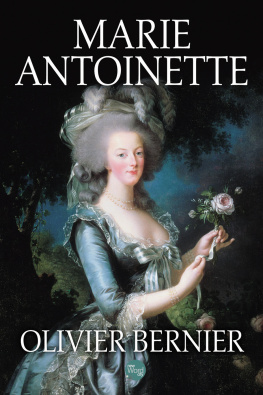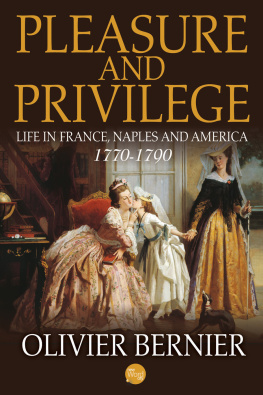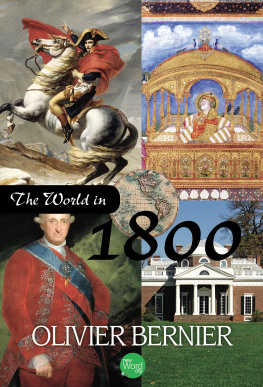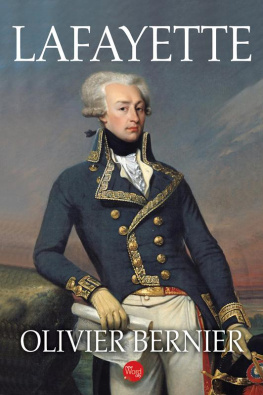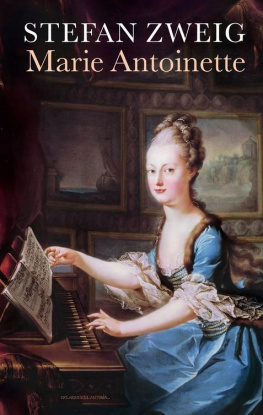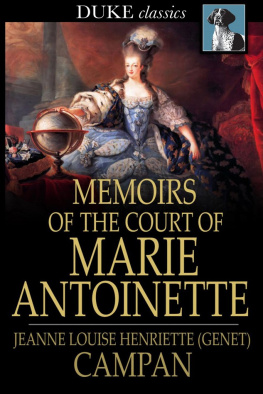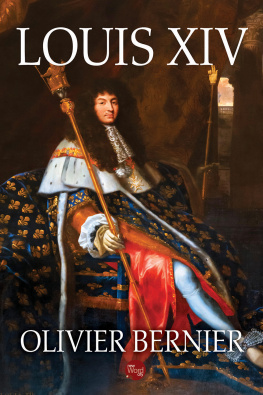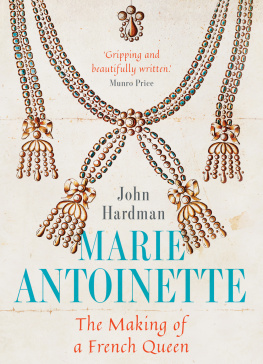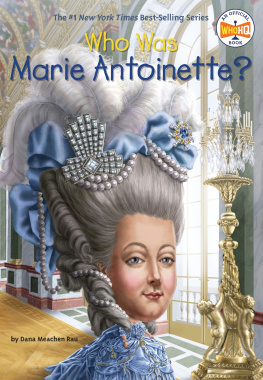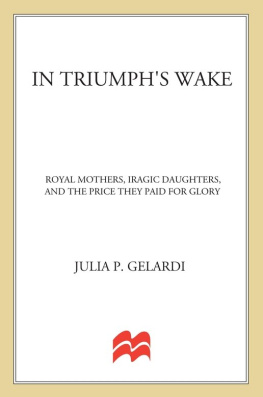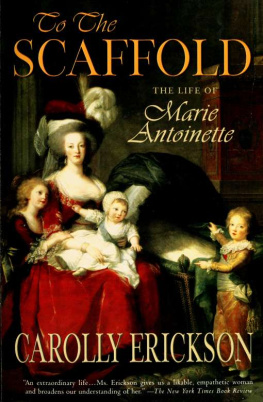
On a cold morning in April 1770, a young girl surrounded by ladies in the richest of court dress stood shivering and naked at the center of a little wooden pavilion on an island in the middle of the Rhine: It was the Archduchess Marie Antoinettes introduction to the French court and its etiquette. Soon she was dressed again, this time in French clothes; her Austrian ladies curtsied and left, and she found herself amid people she had never seen before in her life, but whom she had carefully been coached to treat according to their rank and office. As for her family, her friends, her servants even, she knew she would never see them again: This was an age when queens did not travel. At least as she walked out, she could take pleasure in the splendid carriages which had been ordered specially for her reception; their panels were covered with gold-embroidered blue or red velvet, while, at the four corners, bouquets of gold flowers trembled in the wind. She could also hope that the comtesse de Noailles, her chief attendant, would prove pleasant, lively, sympathetic.
As she quickly discovered, however, Mme de Noailles was a dry, uninteresting woman whose main interest was the complex, subtle etiquette, that first preoccupation of all French courtiers; and far from sympathizing with the homesick girl, she thought it her duty to ignore all feeling, so during those long hours in the swaying carriage, the archduchess was taught all about the rules of precedence, was told who was entitled to a kiss on the cheek, who merely to a nod, and was generally treated as if she had been an old lady whose only interest in life was the table of ranks. Of course there were interruptions: Every town she entered greeted the future queen of France with parades, speeches, banquets, fireworks and more speeches, and it was noticed that Madame la Dauphine, as she was now called, listened, responded, smiled, and curtsied with such grace that she won all hearts.
It was a brave effort, but then, only a few days earlier, the fourteen-year-old archduchess had been thoroughly briefed by her formidable mother, Empress Maria Theresa; indeed, the two had shared the same bedroom for a week just so that the girl could be prepared for her new life. Then, when the time came to leave her beloved Vienna, Marie Antoinette had received a long, detailed set of instructions which she was urged to read and reread frequently; meanwhile, away at Versailles, the Austrian ambassador, Florimond, comte de Mercy-Argenteau (called Mercy, for short), stood ready to advise the young princess. More than just a successful marriage was at stake, after all: The wedding of the dauphin of France to an archduchess of Austria was the living symbol of the alliance between the two countries, an alliance which was the foundation of Maria Theresas foreign policy, one of the great achievements of her reign. If Marie Antoinette failed to charm the k ing , the dauphin , and the Court, the French might be tempted to revert to their old friendship with Frederick II of Prussia, a man Maria Theresa referred to, in private, as the Devil.
That Marie Antoinette might dislike her husband and be miserable at Versailles hardly seemed worth considering. This was a political union, not a love marriage. Bella gerant alii, tu, felix Austria, nube (Others wage wars; you, happy Austria, marry) - so went the motto. Not for nothing had Maria Theresa given birth to half a dozen daughters; in an age when royal weddings were an important form of politics, it was her policy to extend her sway by that most peaceful of weapons, the nuptial alliance. Already in 1770, one archduchess was married to the king of Naples while another had become duchess of Parma: All over Europe, Bourbons and Habsburgs were to be linked by marriage so as to guarantee the safety and prosperity of Austria.
Of course, Marie Antoinette was fully aware of all this; the empress had not wasted her time during those nights spent with her daughter. Marie Antoinette had been made to understand that she would play an important role, but she also took pride in having been chosen to sit on the most glamorous throne in Europe. It was one thing to reign over scenic but underdeveloped Naples or tiny Parma, as her sisters did, quite another to be queen of France. This had been impressed on her in Vienna, and she felt properly grateful to her mother, who had chosen her for the position. Unfortunately, one thing the empress had never mentioned was that she would have a duty not just to the empress but also to her new country. The French, Marie Antoinette felt, were lucky to get a daughter of the great Maria Theresa. Of course she must be gracious and dignified in public: that was how a mighty Princess should always appear, but beyond that, she felt all the freer to indulge herself since she was just emerging from a strictly regulated education.
Such behavior was no less than the empress feared. Like Queen Victoria, she distrusted her children and often, one cannot help feeling, disliked them, although she was a spectacularly conscientious mother. The strictest discipline was observed in the Schnbrunn nurseries. The empress saw her children every day, kept abreast of their lessons, their physical and mental development, even their carefully regulated amusements. She praised their progress in drawing, singing, and dancing, and liked showing them off. This was most unusual in the eighteenth century, a time when children, who were considered subhuman, were normally neither seen nor heard.
It is, in fact, one of the paradoxical aspects of Maria Theresas character that this proud Habsburg empress , this courageous and effective ruler, reminds one, in her dealings with her children, of nothing so much as a caricatural Jewish mother. Blending pride in her brood with devastating put-downs , constant whining with anxious queries about the childrens health, and a cold-eyed appraisal of their talents with fervent protestations of love, Maria Theresa produced in her sons and daughters reactions which seem oddly out of place in her time: Rebellious , resentful, yet dependent, they belong more to our century than hers. The key to this peculiar development may well be the fact that the empress seldom meant what she said, that she set impossible standards and coupled harsh criticism with declarations of affection. Spare the [verbal] rod, spoil the child might well have been her motto - but with a difference: Because she was a uniquely conscientious sovereign, she always put the needs of the State before those of her family. As a result, while she expected her children to be moral, literate, and hardworking, she also made it clear that even the most sacred principle must give way to political needs.
Still, difficult though the empress might have been, her children were brought up in much closer proximity to her than was considered normal, partly at the behest of her husband, Francis of Lorraine. A kind man with a huge appetite for food and women, Francis turned out to be the perfect consort. He made his wife an empress, thus preserving the Imperial crown for the House of Habsburg since the Holy Roman Empire allowed only male sovereigns, but this august position gave him practically no power. The empire, which was composed of several hundred independent states, existed only in theory, and there was little the emperor could do except for conferring titles; his was, in fact, a purely ceremonial role.
Maria Theresa, on the other hand, as the only living child of Charles VI of Habsburg, had inherited all the dynastys possessions: Hungary with a good piece of todays Romania, Upper and Lower Austria, Bohemia and Moravia (todays Czechoslovakia), Carinthia, Carniola , the duchy of Milan, the kingdom of Naples (soon lost but replaced by Tuscany), and the Austrian Netherlands (todays Belgium). She ruled these extensive but disparate lands herself with the help, from the 1750s on, of Chancellor Kaunitz. As for Francis, he had little to do except appear on great Court occasions, sleep with the empress , and enjoy the revenue from Tuscany which was his for life. He collected precious objects, chased (in secret) after women, and spent time with his children. Unlike Maria Theresa, who was both busy and hypercritical, he was a kind, encouraging, often present parent who created a warm family atmosphere in which the children could feel loved and appreciated. It was Marie Antoinettes great misfortune that the emperor died in 1765 when she was only nine years old. After that, she was left to the care of a devoted but incompetent governess who helped her fake her homework so that the empress would not realize how backward the little girl was.

